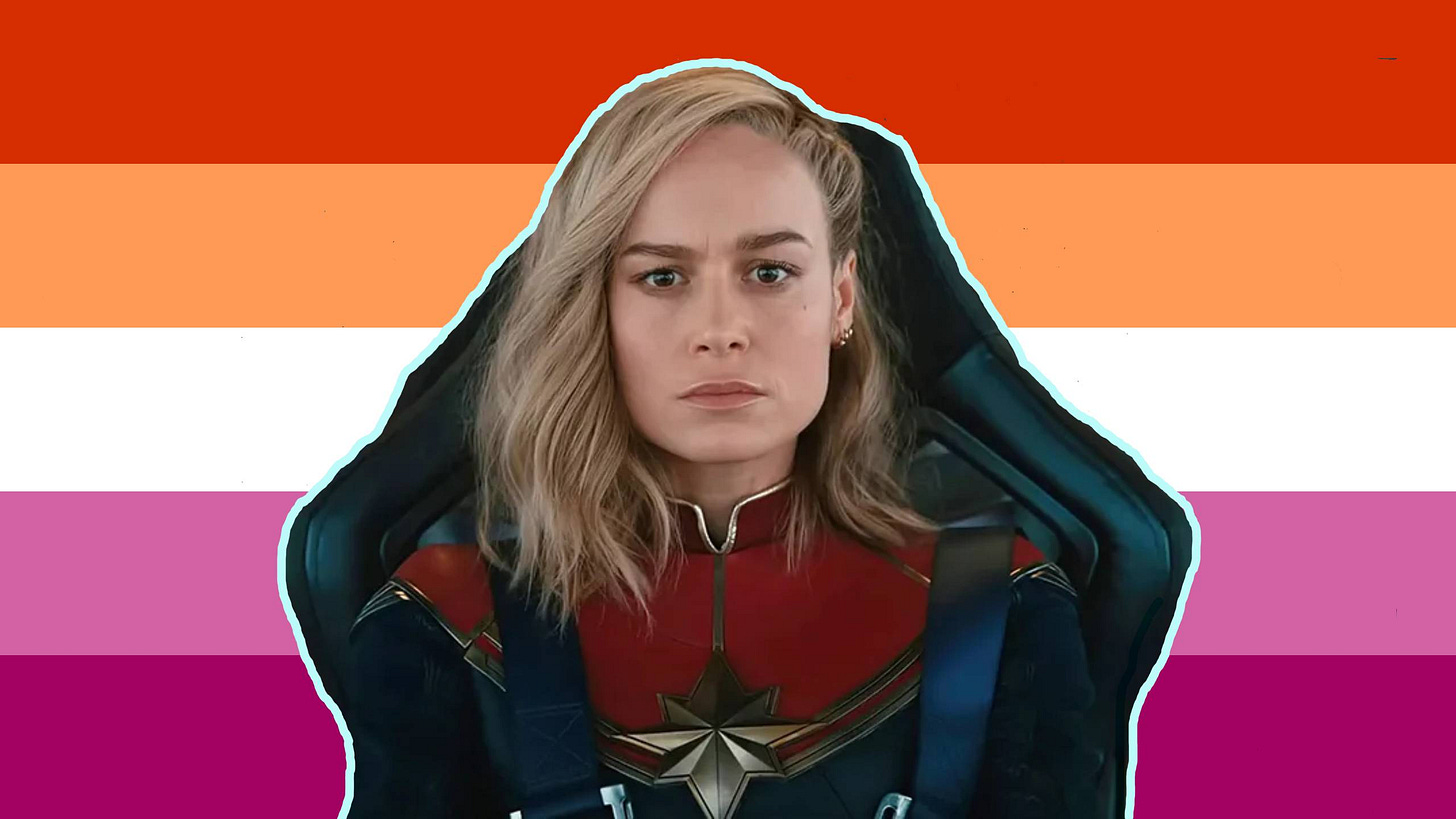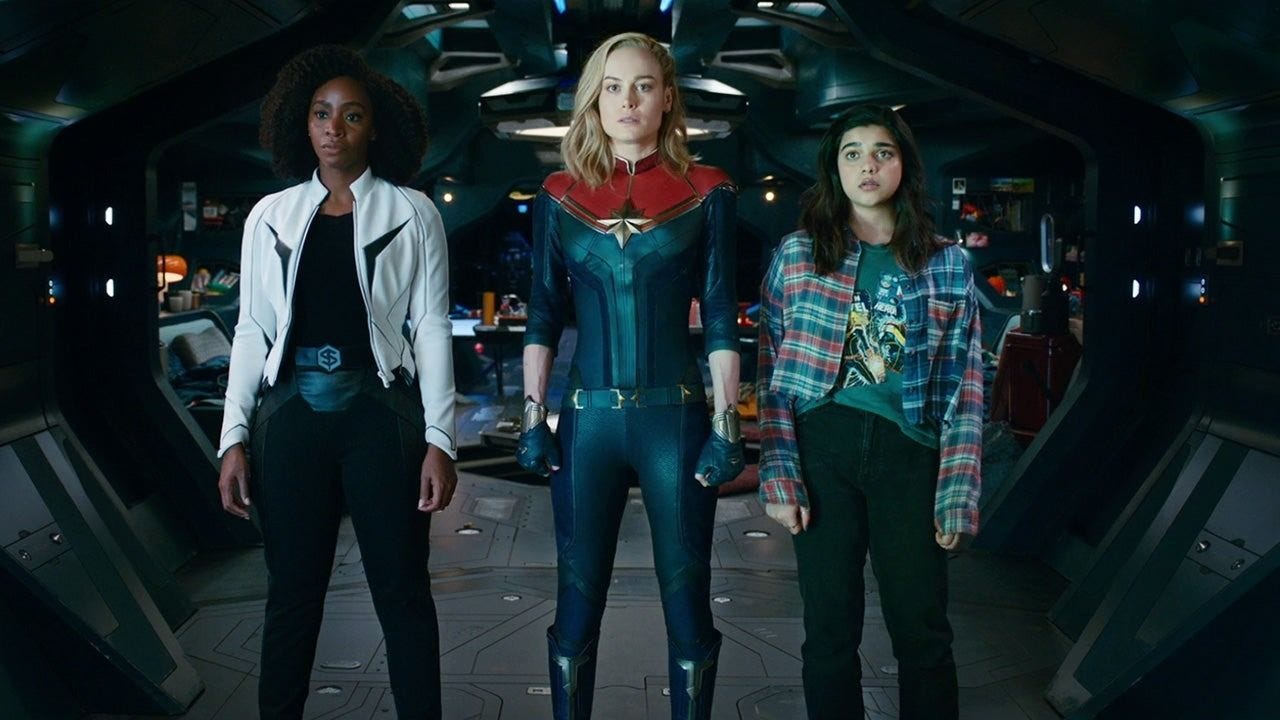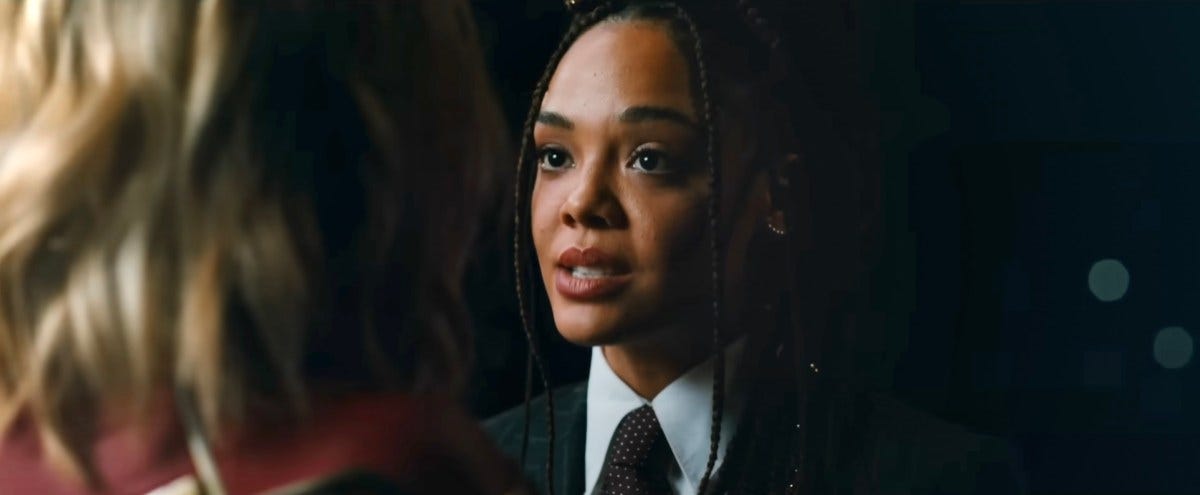‘The Marvels’ Keeps Queerness In The Subtext
But did we really expect more?
This is the Sunday Edition of Paging Dr. Lesbian. If you like this type of thing, subscribe, and share it with your friends. Upgrade your subscription for more, including weekly dispatches from the lesbian internet, monthly playlists, and a free sticker. I’ll be taking next week off for Thanksgiving, but paid subscribers will still get their Wednesday dispatch.
The biggest news about The Marvels – the sequel to 2019’s Captain Marvel and Nia Dacosta’s first foray into the MCU – is that it flopped. The film made only $47 million at the box office opening weekend, the lowest opening ever for a Marvel movie. And yet, that disappointing number is still the highest opening weekend for a black woman director.
Prior to its release, much of the discourse about the film centered on the women involved. Controversy erupted when Variety reported that Dacosta flew to London during post-production. The film’s star, Brie Larson, is by far the most-hated figure within the MCU, and unsurprisingly, The Marvels drew the same kind of anti-woke criticism as its “female-centric” contemporaries.
Despite all this negative press, The Marvels is an above-average film, at least by MCU standards. The three leads have delightful chemistry, and Dacosta’s decision to keep the film at a brisk 105 minutes – the shortest in MCU history – was a smart one. The movie’s absurdist humor is a much-needed counterbalance to all the Marvel multiverse nonsense, though it still gets bogged down by these entanglements in the end.
But what of the film’s representational politics? For viewers who maintain a sense of optimism, there is always the hope that the studio will finally do something interesting with the “diversity” it has touted in recent years. The Marvels doesn’t offer anything new to celebrate on that front, though we are left with a lot to ponder.
When Captain Marvel came out in 2019, queer fans immediately latched on to the relationship between Carol (Larson) and Maria (Lashana Lynch). To those with a queer eye, it seemed so obvious that the two women were a little more than friends. Even the film itself acknowledged that they were a family, raising Maria’s daughter Monica together. Larson herself has garnered a large sapphic fan base since her entry into the MCU, in part because of the intense workouts the role necessitated.
Of course, Marvel Studios never did anything to canonize this relationship or Carol’s purported queerness, unless Captain Marvel’s extremely gay haircut in Avengers: Endgame counts as evidence. In WandaVision, we learn that Maria died of cancer while Monica (Teyonah Parris) was “blipped” by the Thanos snap. This presumably put an end to any Carol/Maria potential, though the existence of the multiverse means anything is possible.
As per usual in Marvel movies, there is a little too much going on in the plot, but the core of The Marvels’ narrative is a family reunion of sorts. Though she helped raise her, Carol hasn’t seen Monica in many years because she’s been off trying to save the world. Monica is understandably upset that Carol wasn’t there for her when she returned from non-existence to find her mother dead. The notion that Monica and Carol are family is noted several times throughout the film, and their dynamic feels very much like a complicated mother/daughter relationship. (What makes this storyline a bit more interesting is the fact that the absentee parent/partner character is usually a man.)
Though Maria isn’t alive in the film, her memory haunts both women, especially Carol. While trying to retrieve the memories that the Kree stole from her, her mind keeps flashing back to memories of Maria and Monica when they were still a family. At the same time, Carol’s grief over Maria feels muted. It’s not as if Larson isn’t capable of giving a more gut-wrenching performance – there’s just not much there on the page for her to work with. Was Maria her best friend, her soulmate, her co-parent? There’s no space to answer these questions, forcing us to read between the lines.
The third piece of this equation is Kamala Khan (Iman Vellani), AKA Ms. Marvel. Kamala is a Captain Marvel superfan, which in a way, aligns her with the viewer’s perspective. She’s obsessed with Carol in a very teenage way, but also in a way that’s a little bit gay. Kamala enriches and complicates the family unit, allowing Carol to resume the mentorship process she abandoned with Monica.
The queerest moment in the film comes during a scene that lasts only a minute. Carol has unwittingly made the Skrull people refugees again, so she calls in Valkyrie (Tessa Thompson) to take them somewhere safe. Valkyrie shows up in a dapper black suit and offers the distraught Carol some words of comfort. The relationship between these two women has recently become a source of fan contemplation, and Thompson plays the scene with both (queer) swagger and softness.
Valkyrie’s status as a canonically queer Marvel character has long been contested, as Thor: Ragnarok director Taika Waititi (or perhaps Kevin Feige himself) cut a scene acknowledging her bisexuality from the film. Later, her queerness was rather disappointingly canonized in Thor: Love and Thunder. Most of her queer persona comes from Thompson herself – those smirks and the way she wears a suit do most of the work. As such, this brief moment of intimacy between the friends (or lovers?) does more to confirm Carol’s queerness than any other sequence in the movie. It feels almost like fan service in this regard, though I haven’t seen anyone complaining.
As for Carol’s romantic history, the only potential suitor Captain Marvel has is her secret spouse Prince Yan (K-drama star Park Seo-joon), who lives on a planet where the residents communicate through song. As Carol explains to Monica and Kamala, theirs is a diplomatic union, and there’s no chemistry between them. To be fair, Marvel characters are famously non-sexual beings, and Carol Danvers is no exception. Larson plays Carol without a hint of sensuality, which only further emphasizes the fact that while she’s technically human, she’s not really. Even her relationship with Maria, as queer-coded as it was, was more romantic than erotic.
Despite their lack of sexual chemistry, Kamala still swoons over Carol and Prince Yan’s royal song and dance, and when Monica asks Kamala if this reminds her of a Captain Marvel fanfiction, she nods enthusiastically. Though this line is meant to signal Kamala’s status as a Gen Z fan, it’s something of a misfire on the writer’s part. The majority of fanfics about Captain Marvel depict Carol in lesbian relationships, with Carol/Maria and Carol/Valkyrie being the most popular ships. (As it stands, not a single person on AO3 has written about Carol and Prince Yan.) In reality, the line only reminds us how out of touch the writers are with what (some) fans really want.
All of this subtext and queer-coding begs the question: do we really want more queerness from the MCU? Mega franchises like this don’t exactly have a great track record when it comes to queer representation. Remember Endgame’s “first openly gay character,” who was played by director Joe Russo and appeared for mere seconds? Or the supposedly “historic” lesbian kiss in The Rise of Skywalker? And what about the fact that the gay character in Eternals is a literal war criminal who did Hiroshima?1
Both Larson and Thompson have expressed their support for more diversity in the MCU. “We gotta move faster,” Larson suggested. That’s all well and good, but Marvel is driven by cold hard cash, not altruism. It’s not unreasonable to wish queer characters could exist in a venue as mainstream as a Marvel movie, and it’s not helpful to chide fans for wanting this to happen. But considering the internal and external limitations of the MCU, it’s unlikely we’ll ever be truly satisfied in this regard.
Either way, fans will keep stanning Brie Larson and her muscles, shipping Captain Marvel with every woman she meets, and hoping for more. All of this is probably good for business – whether it’s good for cinema is another question entirely.
To be fair, Carol Danvers is also an accidental war criminal. Nobody’s perfect.






I bet Hela has something to say in this... I know, I know, they killed her, but 1) how can the Goddess of Death die? and 2) it’s a multiverse 😆